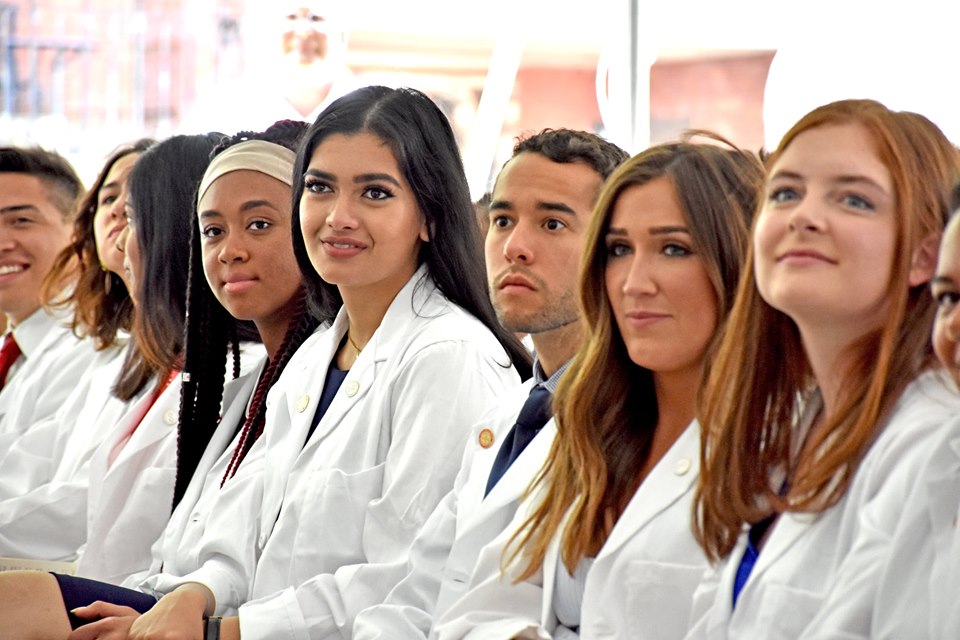Compassion, the Most Important Tool in Your Black Bag
Eager to start their medical education, 160 students lined the walkway under the Talbot building arches leading to the massive white tent on the green. Despite the heat, hundreds of family members and friends craned their necks and held cameras and phones high above their heads attempting to capture an image of their loved one proudly carrying a short white coat over their right arm.
The white coat ceremony is a symbolic rite of passage for medical students. On Friday, Aug. 2, students pledged their commitment to their profession and the trust, which they must earn from their patients.

Associate Dean for Student Affairs Angela H. Jackson, MD, welcomed the students and their invited guests.
Kristen Goodell, MD, Associate Dean for Admissions, shared, “You have met academic and personal challenges; had successes and failures; sacrificed much and accomplished a great deal to reach this moment. As you move into the next phase of your journey, each of you will struggle, each of you will have doubts, and at some point, each of you will look in the mirror and wonder, can I really do this?”
“What will sustain you in these difficult moments will be your own skill and talent, your own resilience and strength of character, the support of your classmates, your family and friends, and the commitment of your teachers and mentors,” she continued. For us as a faculty it will be privilege to walk part of the way with you and perhaps to guide you, just a little bit. …Dean Antman, it is my honor and my privilege to present to you, the Boston University School of Medicine entering class of 2019.”
Drawn from a pool of more than 9,000 applicants through five entry pathways and 65 undergraduate institutions, this class is 46 percent women and 14 percent from underrepresented groups in medicine.
The class is special in many ways. Its members represent 28 of the 50 states in the U.S. and the list of birthplaces include 19 countries; more than 88 percent are at least bilingual, and as a group speak 25 different languages.
BUSM Dean and BUMC Provost Karen H. Antman, MD explained to parents “don’t be surprised if your student finds their life partner among their classmates. It’s very common, perhaps because they won’t see anyone else for four years,” causing the students and guests to laugh.
Guest speaker Thea James, MD, Associate Professor of Emergency Medicine; Associate Chief Medical Officer and Vice President of Mission, Boston Medical Center; Director of the Violence Intervention Advocacy Program (VIAP), spoke of how she contemplated her remarks “so that they would positively impact your experience over the next four years and beyond.”
“My decision to become a physician was the best decision I have made in my life… Imagine a job where people arrive all day every day with a range of emotions: sadness, excitement, anxiousness, depression, even anger,” she continued. “As a physician you get to be the one that can shift or change that person’s perspective. And you see it happen right in front of you. It happens when you engage with patients and their families; no assumption, just listening, learning and acknowledging that you hear them. You hear what they’re saying and how they’re feeling.”
“In a while you’re going to realize that being a physician is a privilege. We have to be mindful of our professional privilege, our individual privilege and the intersections associated with that. We have to remember people trust us and come to us for help when they are in their most vulnerable state. We have to be self-aware and mindful of not causing further emotional and lasting harm.”
Dr. James concluded by addressing a paradigm shift in how healthcare is impacting vulnerable populations. She explained that “the good news is that you happen to be members of a medical campus characterized…by a culture of deep commitment, creativity, thought leadership, visionaries, advocacy and mission-oriented people. This includes a very active and robust research culture. …We have the foundation to address equity and the social determinants of health. You don’t have to be concerned about whether you will be able to do something about the root causes of your patient’s instability. You don’t have to be afraid to inquire, to ask the questions for fear of not being able to do anything about it.”
Prya Garg, MD, Associate Dean for Medical Education, recited the student names while faculty members Robert Beazley, MD, Assistant Dean, Student Affairs; Pablo Buitron de la Vega, MD, Associate Professor, Medicine; Vonzella Bryant, MD, Assistant Professor, Emergency Medicine; Ryan Chippendale, MD, Assistant Professor, Medicine; Andrew Clark, MD, Assistant Professor, Psychiatry; Molly Cohen-Osher, MD, Assistant Dean, Medical Education, Assistant Professor, Family Medicine, Medical Sciences & Education; Samantha E. Kaplan, MD, MPH, Assistant Dean, Diversity & Inclusion, Assistant Professor, Obstetrics & Gynecology; Padma Kandadai, MD, MPH (CAS’00), Assistant Professor, Obstetrics & Gynecology; Wendy Kuohung, MD, Associate Professor, Obstetrics & Gynecology; Robert A. Witzberg, MD (MED’77) Professor Emeritus, Medicine, coated students.
John Polk, MD, Associate Dean for Diversity & Inclusion, addressed the new students. “As Stephen W. Trzeciak, MD, Chair of Medicine at Cooper University says, the most important thing you can say to a patient, no matter what the diagnosis is ‘I am aware that your illness is important to you. It is important to me also. We are in this together. I will be with you along this journey.’ The most important tool in your black bag is not your smartphone, it’s your ability to listen. That is what we call patient-centered care. We know you can do this.”
The class then recited the Hippocratic Oath for the first time, which was led by Jean E. Ramsey, MD, MPH (MED’90, SPH’08), Associate Dean for Alumni Affairs, who welcomed the students to the study of medicine.
See more photos on Facebook.